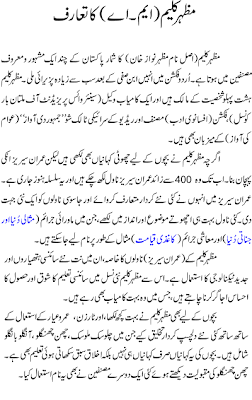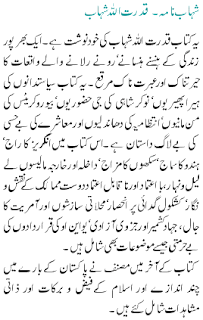Mazhar Kaleem (Urdu: مظہر کلیم) is a Pakistani novelist chiefly famous for his Imran Series novels, Urdu spy fiction written within Imran Series mythos created by the late Ibn-e-Safi.
He is known for writing the Imran Series and has written short stories for children as well. He is the anchorperson of a famous saraiki radio talk show from Radio Multan, "Jamhoor-de-Awaz". He is a successful lawyer who was elected as Senior Vice President of Multan Bar Council and he heads a chamber in District Courts Multan.
Mazhar Kaleem was born on 22 July 1942 in Multan. His father Hamid Yar Khan was a retired police Inspector. He belongs to a Pathan family,"Muhammad Zai" in Multan, who settled in Multan after migrating from Afghanistan in the late 19th century. His original name is Mazhar Nawaz Khan; however he is now only known as his literary pen name, Mazhar Kaleem Khan.
He studied in Islamia high school Multan and graduated from Emerson College (Current Government College). He was a color holder in basketball and bodybuilding from Emerson College. After graduating he taught as a master in a government high school, Daulat Gate, but he left it to pursue more studies at the University of Multan (currently Bahauddin Zakariya University) to do his M.A. in Urdu Literature and LL.B. He is a senior lawyer in Multan Bench of Lahore High Court. Professionally he is a lawyer and not a novelist which is his part time hobby. He is also anchor person of a radio talk show from Radio Multan. His original name is Mazhar Nawaz Khan while Kaleem is his literary adoption. He had two sons and four daughters but his eldest son Faisal Jan died at the age of 31. The second son Fahad Usman Khan is working in a Multinational Bank.
Mazhar Kaleem is a contemporary of Ibn-e-Safi in writing Imran series and he just copied the few principal characters but always had a different style. While many writers notably Safdar Shaheen & Ibne-Rahat tried to cash in on the popularity of Imran he is unparalleled now as undisputed master of writing Imran Series. He has written over four hundred novels and has introduced new style of spy novels writing. Almost every grown up person in Pakistan who had been fond of reading has read one or more of his novels. He is based in Multan.
Mazhar Kaleem has done a great and valuable literary work in Urdu Adab, especially in suspense and spy genre of the Adab. A little light is thrown below on his work.
Imran Series:
Imran Series is a series of novels by Ibn-e-Safi. Owing to lack of effective copyright laws in Pakistan, many writers tried to cash in on Ibn-e-Safi's popularity and began writing Imran Series and Jasoosi Dunya (another popular series by Ibn-e-Safi), shamelessly using identical characters. While the creator Ibn-e-Safi could write not more than 120 Imran Series novels, Mazhar Kaleem wrote more than 500. He brought many new characters to the Imran Series and introduced various new topics like mystic crimes (Misaale Dunya) and economic crimes (Kaghazee Qiyamat). He has written many high rated novels like as Shilmaak,Bagoop,Khamosh Cheekhain,X-2,Ganja Bhikari,Tiger In Action,Juana In Action and many more.
Although the novels have no literary stature, yet they are popular in the Pakistani youth. Currectly, he is writing more metaphysical thrillers.
Many critics say it is not only illegal to copy another author's characters; it is no less than a scandal to enjoy the fame and money earned through it.
Mazhar Kaleem has also written stories for young children. He has introduced many characters like Chaloosak Maloosak, Chan Changloo, and Aangloo Baangloo & Faisal Shahzad Series beside using Umru Ayyar and Tarzan in his stories.
Chaloosak Maloosak:
Chaloosak Maloosak are two brothers and their father who was a top notch scientist made a space travel vehicle which his sons secretly used one day and left for space tourism. In each story they reach a new planet with exotic creatures and challenges to their lives.
Chan Changloo is a small boy with a lot of Nuri powers to fight against Wizards and he has a friend Mangloo Monkey. After a number of books on Chan Changloo, new character named shamli was added to his side. The daughter of a wizard and a great wizard herself, Chan Changloo fights against evil powers in each story and brings relief to common people.
Aangloo & Bangloo are two brothers. Aangloo is tall, thin with a big head and Bangloo is fat, short and small head. Both are bachelors and in search of a bride. In each story they fight with wizards, genies and other forces to get a princess. The stories are extremely humorous and very original in storyline. They are always caught in a fix in the end as the princess is one and cannot marry both and she sends them to some other world to get an even beautiful princess.












































